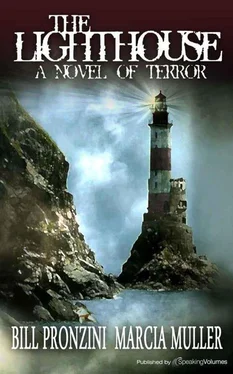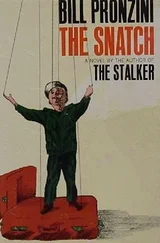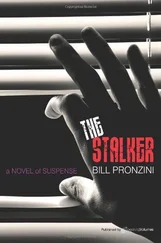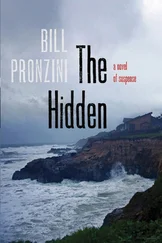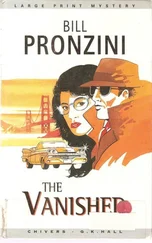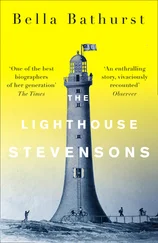The thought intrigued him. A-1 Marine in Hilliard would probably have compressed air tanks. Better yet, he could pick them up while he was in Portland next week.
There was nothing more to occupy his attention in the lightroom; he went from there into his study. He felt somewhat better now. His labor with the diaphone and the prospect of operating it had temporarily crowded the death of Novotny’s dog, all his other fears, into the back of his mind. More work on the book? Yes, while he was still in a productive mood. He sat down before the Underwood, loaded and fired another of his pipes, and plunged into work without any of his usual mild procrastinations.
Lighthouse construction. Basic design of the modem light-house originated by John Smeaton in 1757-famous Eddystone Light in the English Channel near the town of Plymouth (where tallow candles served to light its beacon for more than fifty years). Stone tower in place of wood. Huge blocks of granite weighing upwards of a ton each, cut so that they interlocked-not only on the flat first course but from one course to the next above. This pattern of construction used as a model for future lighthouses worldwide…
It went well. Eight and a half pages. And all of the material, he felt, incisive and informative without being dry or pedantic. He lost all track of time, so that when Alix appeared at his side, startling him slightly, to announce that dinner was ready, he said, “Dinner? My God, is it that late?”
“Almost eight.”
He glanced over at the window. Dusk had fallen without his having noticed it. He rolled his head, stretching the tightened muscles in his neck and shoulders. After a moment Alix moved over behind him and began to massage the tight area, her thumbs kneading along his fourth cervical vertebra. That, and the weariness that had replaced the anxiety and anger in her expression, told him that it was all right between them again. At least for now.
He said, “Wasn’t it my turn to cook tonight?”
“I came up earlier, but you were so involved I decided not to disturb you.”
“Thanks. I’ll take mess duties tomorrow and Monday.”
They went downstairs. Pan-fried chicken, asparagus, a small salad. Beck’s for him, white wine for her. He ate with some appetite; Alix picked at her food. They made small talk at first-neutral topics. Then he told her about the diaphone, and they discussed her next illustration (the Eddystone Light), and after that they were no longer awkward with each other. They cleaned up the dishes together, went upstairs, she read his pages, they went to bed. And during all of it he felt almost relaxed, normal, as if nothing ugly had happened last night, as if their life together weren’t about to change so radically that neither of them would ever be the same again.
But the feeling of normalcy was an illusion, a lie erected by his mental defenses. It was his body that told the truth. He had the desire to make love, once they were in bed, and Alix was willing, but there was no physical response in his loins; it was as if he had gone dead from the waist down. Alix’s touch, always electric, did nothing for him. He had never had this kind of failure, no failure at all except for the one time he’d gotten a little too high on champagne punch at the faculty New Year’s Eve party.
“It’s okay,” she murmured against his ear, “don’t worry about it,” but it wasn’t okay. It was another thing that frightened him. What if this wasn’t just an isolated instance? What if he became permanently impotent as well as permanently blind? Pain, deterioration both physical and mental-unmanned in every way.
What if I did hit that dog on purpose? I don’t remember, I don’t remember…
He held her tight and began to stroke her slowly, gently, concentrating his caresses on her clitoris, concentrating his thoughts on her instead of himself. In the dark she whispered, “You don’t have to,” and he thought, Yes I do, and said, “I want to,” and after a while she came shuddering against him, with her face turned sideways against his chest. And even her orgasm did nothing to arouse him. Nothing at all.
Her face still pressed to his chest, she whispered, “Oh, Jan, I love you.”
“I love you too,” he said, and thought: That’s enough, isn’t it? Even at the end, when the darkness comes, it’ll be enough.
He went to sleep holding her, loving her, and not believing any of it.
The first rifle shots woke him immediately.
He sat up in bed, groggy at first, but as always when he was jerked out of sleep the disorientation passed in a few seconds and he was alert. Next to him Alix stirred, came half-awake, mumbled something incoherent. He looked past the shape of her, at the red numerals on the Sony digital clock radio. 3:18.
He had no idea at first what the noises were, didn’t identify them as gunshots until something made a metallic spanging sound outside-close outside, on the lighthouse grounds-and then he heard the hollow echo of the third shot. He thought: Jesus! and swung his legs out of bed, fumbled with hands and feet for his slippers. He was aware, now, that the room was not fully dark, that there was whitish moonlight coming through the window.
Glass shattered, faintly but unmistakably. And the reverberation of the fourth shot rolled like a small thunderclap, died away into a heavy silence.
Alix was awake now, sitting up; her voice reached out for him, frightened and confused, as he stood and groped for his robe. “Jan, what is it? What’s happening?”
“I don’t know. Stay here, I’ll find out.”
He ran out into the hall, pulling the robe around him, and half-stumbled down the stairs into the living room. The windows, like the one in the bedroom, faced seaward; there was nothing for him to see in that direction. The kitchen, then. He ran in there, leaned up to peer through the curtained window above the sink. The moonlight was bright out on the grounds: the cloud cover had broken up sometime earlier, leaving the sky clear and hazed with stars. The patch of grass that separated the lighthouse from the garage had a whitish cast, as if it had been dusted with talcum powder; the walls of the garage, the fence farther down, showed faintly luminous. He could see beyond the gate, all the way along the rutted cape road to where it jogged inland and disappeared into a hollow.
Nothing moved anywhere.
No sounds, either-no more shots. Just that intense silence, like a noise in his ears pitched too high for him to hear.
The breaking glass, he thought then. Window in the garage? But the station wagon caught and held his attention. It was parked thirty yards away, at the edge of the grass, swung around at an angle to the north; he could see that the front end was listing his way, that the left front tire was flat.
He swung away from the sink, hurried up the steps into the cloakroom for his coat, came back down and through the kitchen to the front door. Alix was standing at the foot of the stairs, clutching her old quilted housecoat around her. She had turned on the lights; they revealed the pallor of her face-the same color as the moonshine outside.
“Jan, those were shots. Was somebody—?”
“They shot the car,” he said grimly.
“What? They what?”
His head had begun to ache; he could feel the pressure starting to build again behind his eyes. “I’m going out there,” he said. “You stay here.”
“Jan, don’t—”
“Lock the door after me. Watch through the kitchen window.”
“No, wait…”
But he didn’t wait; he opened the door and walked outside.
The wind had died down to a murmurous breeze; it occurred to him peripherally that that was why he had been able to hear the shots so clearly, the ricochet and the breaking glass. But it was still cold, not much above forty degrees. There was a crystal-like quality to the air, so that every object stood out in sharp relief.
Читать дальше
